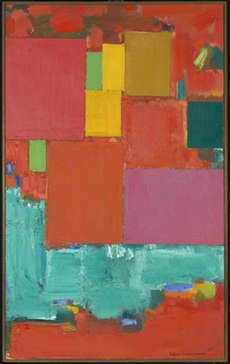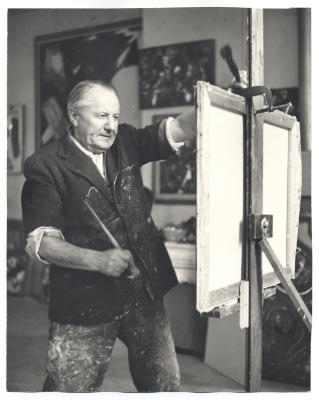Artists
Related: About this forumLoving Hans Hofmann: Painter, Pioneering Teacher To Abstract Expressionists, Giant of 20th C. Art
Last edited Sat Dec 12, 2020, 09:30 AM - Edit history (2)

- 'Sic Itur ad Astra'/Such Is The Way To The Stars, Hans Hoffman, 1962.
'The Case for Loving Hans Hofmann, Pioneering Teacher to the Abstract Expressionists.' Art News, June 16, 2020.
Hans Hofmann routinely receives more credit as a teacher than as an artist in studies of his era, his most enduring work came only at the end of his long career, and his paintings regularly straddle the line between various schools (elements of Cubism, Fauvism, and more cohabit), all of which has made him a tricky figure to pin down and properly appreciate. But he’s an underrated giant of 20th-century art hiding in plain sight. Plenty of successful artists spend a lifetime fixated on one visual idea. Hans Hofmann was the exact opposite, rethinking his art and rethinking it again, bobbing and weaving for decades. ..A leading light of his day, Hofmann was safely ensconced in the history books before his death in 1966, a month shy of his 86th birthday. The Museum of Modern Art in New York organized a survey in 1963..Institutions around the world own his art. However, if you could visit MoMA today, you would find not one of its four Hofmann canvases on view.
And in art-historical accounts, he typically receives respectful but passing notice, more likely as a teacher than as a painter. Hofmann is, as the critic Charles Desmarais succinctly put it, “revered by many, but rarely loved.” Here is the case for loving him.

- Hans Hoffman (1880- 1966) in his studio. https://en.wikipedia.org/wiki/Hans_Hofmann
[Wiki. Hofmann, a German-born American painter, was renowned as both an artist and teacher. His career spanned 2 generations and 2 continents, and is considered to have both preceded and influenced Abstract Expressionism. Born and educated near Munich, he was active in the early 20th c. European avant-garde and brought a deep understanding and synthesis of Symbolism, Neo-impressionism, Fauvism, and Cubism when he emigrated to the U.S. in 1932. Hofmann's painting is characterized by its rigorous concern with pictorial structure and unity, spatial illusionism, and use of bold color for expressive means...]

- Hans Hofman, 'Pompeii,' 1959.
Hofmann’s wildly varied paintings point the way toward a large swath of the most exciting contemporary abstraction. He was a gallant experimenter, refusing to settle on a single style for long. His career is a case study in spurning easy answers. “What I would hate most is to repeat myself over and over again,” he once wrote. The late “slab” paintings, Hofmann’s most famous works (rightly so), are especially potent now..Painted at the dawn of the television age, they look like so many proliferating screens. But beyond such visual parallels and rhymes, what makes Hofmann’s work so exhilarating is that it is often so gloriously, genuinely, unrepentantly ugly, to degrees the paintings of his contemporaries rarely are. There is too much happening in the them, and certainly too many competing colors. They only sometimes resolve themselves..

- Hans Hofmann, 'The Vanquished,' 1959.
The reasons for Hofmann’s relative sidelining have been well-rehearsed by now. He spent fully half his life as a devoted teacher, running schools in Munich (from 1915 to 1933) and then New York, when the Nazis came to power. Art history has had difficulty reckoning with artists who wear more than one hat. But many are multitaskers now—teaching, designing, writing. There is also the melancholy truth, often repeated, that Hofmann’s strongest work came only late in life. He spent a decade in Paris at the start of the century, painting in succeeding figurative styles, with Cézanne a lodestar. Almost all of this art was lost with his relocation to Manhattan; surviving examples, and his work in the 1930s, are intelligent but infrequently dazzling.
As a teacher, though, he was a force of nature, a man with catholic tastes who invigorated students as disparate as Allan Kaprow, Louise Nevelson, Marisol, and Greenberg with his focus on free thinking. (“Art teaching is not soap manufacture,” he wrote in 1931.)..Visiting with Pollock in 1942, he also provided one of the modern art’s great quips. “Do you work from nature?” Hofmann asked the then-unknown artist. “I am nature,” Pollock replied. (Let’s skip, as pointless, the debate about who dripped paint first: only one of them developed it.) Intent on securing his artistic legacy, Hofmann shut his school in 1958. He was 78 years old and about to paint his best work, just as Ab-Ex went Pop. Eight years later, he was dead, and his star began slowly fading.
Thankfully, there has been new momentum behind him lately. The Berkeley Art Museum and Pacific Film Archive in California, where the artist deposited a trove of his paintings, organized a retrospective last year, and a catalogue raisonné was published in 2014...
More, https://www.artnews.com/art-news/artists/why-is-hans-hofmann-important-abstract-expressionism-1202691320/

- 2019 exhibition at Berkeley, CA, 'Hans Hofman, The Nature of Abstraction,' 1. Atelier (Still Life, Table with White Vase), 1938; 2. Still Life–Round Table on Red with Palette and Painting, 1930; and 3. Table with Fruit and Coffepot.
lunatica
(53,410 posts)I went through an abstract expressionism period which really stretched my imagination and my emotions, and found out that was basically what it’s all about.
At least in my case what would happen once I started the painting was that it was what was on the canvas that made demands of me. You don’t paint things or objects or portraits. You paint motion, stillness, balance, brush strokes, and color, color, color! Everything on the canvas relates to everything else and how you apply it.
I feel that when you look at abstract expressionism, or any abstract piece of art you need to look at how it’s done and find the things I list in the previous paragraph and don’t forget the details. The canvas demanded they should be there.
I don’t see anything ugly in those paintings, but I do see an abandonment to the demands of the canvas.
appalachiablue
(41,114 posts)how you can see nature there in its splendor. His use of vivid colors and the spiritual quality of many pieces is truly inspirational, breathtaking. After many years, I'm glad this underrated art leader is receiving more due recognition.
